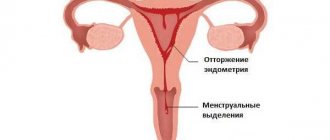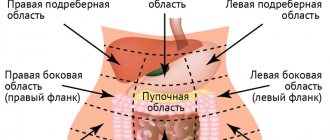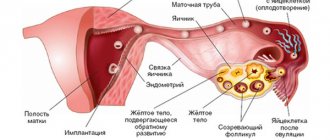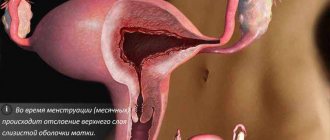The first signs of pregnancy in the first week
A large number of women have no idea that they are pregnant in the very first stages. This happens because many are not familiar with the signs that may appear in the very first days after conception. A sexually active woman who does not use contraception and is expecting pregnancy will undoubtedly be able to detect the changes that have occurred in the body.
Signs of conception in the first week:
- minor bleeding;
- increase in basal temperature;
- weakness;
- breast swelling;
- drowsiness;
- absent-mindedness;
- change in taste;
- nausea;
- intolerance to any odors;
- headaches and lower back discomfort;
- copious discharge. They are also features of the beginning of pregnancy and appear after conception. In this case, it is possible to find out about pregnancy even before your period is missed.
Every woman's body is different, and symptoms manifest themselves differently. Sometimes the whole spectrum appears, and sometimes only part of the list appears. Experienced mothers feel changes in the body starting from the first days, and the rest learn about their situation after a delay or consultation with a doctor.
In the first place when determining successful conception is an increase in basal temperature. To find out the correct temperature, you need to measure it regularly for several days in a row in the rectum.
The procedure is performed early in the morning, without getting out of bed. During pregnancy, the basal temperature should not exceed 37 degrees, but in some cases it rises to 38, this is due to the increasing concentration of progesterone in the blood.
After conception, the basal temperature remains unchanged for up to 2 weeks. After 14 days, the thermometer will drop to its previous levels.
Malaise is also a symptom of pregnancy. During the early stages of pregnancy, some may experience a runny nose and sore throat. During this period, immunity weakens.
Breast swelling appears within 7-14 days. Pain is felt when touched, but not every pregnant woman experiences this.
Since the uterus begins to enlarge during pregnancy, a woman may feel pain in the lower abdomen . In addition, hemorrhoids and intestinal upset may occur.
Toxicosis usually appears several weeks after successful conception. At the same time, taste qualities and food preferences change.
Causes of discharge
Discharge after conception before delay is due to several reasons. They can be conditionally normal and painful.
Normal secretion is explained by an increase in progesterone in the blood , a hormone that is responsible for the successful fertilization of the egg and its attachment to the walls of the endometrium. The secreted contents are painless, odorless and do not bother the woman.
Pathological discharge shows that a malfunction occurred in the body when pregnancy occurred. Marks on underwear are alarming due to their unusual color, smell, and often occur against the background of pain in the lower abdomen. Even if a woman does not plan to continue the pregnancy, this discharge is a reason to consult a doctor for treatment.
Other causes of pain
A healthy and balanced diet is very important
In some clinical cases, painful symptoms may have a rather harmless origin, so it is necessary to take into account the nature of the pain. If the pain is nagging, then it is usually associated with changes in the body during pregnancy, but cramping pain can occur against the background of progesterone deficiency. It is this hormonal substance that controls implantation processes and ensures normal pregnancy.
If the ovarian glands secrete progesterone hormone in insufficient quantities, then the pregnancy is in real danger of failure, because with progesterone deficiency, the uterine body tries to reject an embryo that is foreign to it. At the same time, the uterus begins to contract, which causes the appearance of cramp-like pain in the lower abdomen after conception.
Cystic neoplasms
Painful symptoms can bother a girl after conception due to torsion of the cystic pedicle. This condition is accompanied by acute pain, which tends to intensify when palpating the ovarian area. If such pain suddenly stops, then it is worth urgently undergoing an examination, because such a disappearance can be caused by the death of nerve cells and tissues.
Discharge during ovulation
Ovulation is the process of the release of an egg from the follicle. Moving along the fallopian tubes to the uterus, it triggers hormonal changes in the body, designed to prepare for the upcoming gestation of the fetus. This is an interconnected action: the hormonal background provides the egg with vitality and comfort.
Women often observe some discharge in the middle of the cycle, and thus find out that ovulation has occurred. Usually they are minor. And if the quality and quantity of the secretion differs from the usual norm, this indicates a high probability of fertilization.
After fertilization of the egg, hormonal changes occur. This lasts for several days. During this period, you can observe swelling of the genital organs and strong discharge, which has a transparent color. They have no odor, lumps or any clots.
You should prepare for motherhood if:
- Profuse discharge began, resembling clear, thick, odorless mucus;
- The consistency resembles the white of a chicken egg, quite viscous;
- Discharge occurs even before menstruation, but on the 12th day after expected ovulation.
What are the most common signs of pregnancy a week after ovulation?
After implantation into the wall of the uterus, the embryo gives an official signal to the body (in the form of hCG) to prepare for pregnancy. It primarily affects the corpus luteum, which is formed after the release of the egg from the follicle. Now it will intensively produce progesterone in order to:
- stop the rejection of the uterine endometrium and the onset of menstruation;
- relieve the tone of the uterus and stop muscle contraction;
- ensure a rush of blood and increased blood circulation in the pelvic organs;
- stimulate fluid retention and breast development.
The main companion during the process of embryo attachment is pain in the lower abdomen. Sometimes it is projected into the ovaries or onto the back and then it seems that it “aches” the lower back.
Painful sensations can be one-time or long-lasting. For example, appear from the fourth DPO and persist throughout the second phase until the delay.
The following are the most common signs of pregnancy , when it makes sense to do an ultrasensitive pregnancy test:
- The day after implantation bleeding;
- If on the sixth or seventh day after ovulation the lower abdomen feels tight as before menstruation, there may even be a slight tingling or burning sensation, but the next day everything suddenly stops;
- At the first signs of toxicosis (ordinary odors make you feel sick or disgusted);
- Characteristic changes in the BT chart.
There are other signs of early pregnancy. For most women, they begin at 8-14 DPO. You can read more about them in this article.
When is discharge considered normal?
Discharge after conception until miscarriage is common. They have a transparent or yellowish tint. No odor. no pain is felt, and there should be no burning or itching.
Discharges that are considered normal after conception until delay:
- They last quite a long time, but do not cause discomfort;
- The quantity changes: either increases or decreases;
- The color is slightly yellow, whitish or has no color at all;
- Without smell;
Normal discharge after conception until the delay is odorless and does not cause discomfort.
- There is no pain during sex;
- The amount of discharge increases during physical activity;
- Increases with excitability.
New sensations during pregnancy should be taken calmly. Regular consultation with a specialist is required.
Pathological discharge
Brown or beige discharge
Sometimes discharge after conception before the delay begins to bother a woman. Especially if they become brown or dark beige. In such a case, you should immediately consult a gynecologist , because such phenomena can have serious consequences for the expectant mother.
Types of pathologies with spotting brown or beige discharge:
- pathological pregnancy (ectopic);
- detachment of the fertilized egg;
- erosion of the uterus.
The reasons for discharge before the delay may be detachment of the fertilized egg, which is accompanied by rupture of blood vessels. This is where smudges appear on the underwear. This requires immediate medical intervention to ensure the safety of the unborn baby.
An ectopic pregnancy occurs when the fetus is implanted inside the fallopian tubes or outside the reproductive system. With this pathology, this type of discharge turns into minor bleeding with severe pain in the lower abdomen.
The consequences for a woman from an ectopic pregnancy are always dangerous. This affects both her ability to have further children and the preservation of her own life. If an ectopic pregnancy is confirmed, it is removed by surgery.
Spotting is a symptom of uterine erosion. They also appear after conception until the menstrual cycle is delayed. This is an inflammatory process of the uterine epithelium, with the presence of minor wounds and ulcers. It responds well to treatment.
Pregnancy theoretically and practically
Theoretically, the beginning of pregnancy is considered the moment the egg is fertilized. But since they have not yet been able to invent a test that can accurately determine the specific time of conception, the countdown is done somewhat differently.
According to obstetricians, the first week of pregnancy is the one that completes the last menstrual cycle. Moreover, depending on the timing of ovulation, obstetricians consider the first week of pregnancy to be the third (sometimes even the fourth). Therefore, this period was called the obstetric week and became the starting point by which the approximate date of birth of the baby can be determined. Usually, the next 38-40 weeks are counted from this period (fetal development step by step in the photo), which separates the moment of conception and the birth of the baby.
Considering the early signs of a long-awaited event, characteristic of the first seven days after conception, they cannot actually be called pregnancy. The fact is that during the obstetric week, the fertilized egg lives through one of the stages of the menstrual cycle. During this period, you can observe its movement towards the uterus. Upon reaching the “final point,” the egg is attached to the walls of the uterus, where the fetus will further develop, as indicated by accompanying signs (possibly nausea, pulling in the lower abdomen, swollen mammary glands, discharge, etc.). It is from the moment that embryo implantation occurs (introduction of an egg into the uterus after successful fertilization) that the pregnancy can begin to count.
At the same time, the practical side of the issue shows that, despite early symptoms and inexplicable sensations that appear, a specialist cannot accurately determine the day of successful conception. Therefore, it is rare that 1 obstetric week coincides with the actual date of fertilization. With careful planning, only the expectant mother can know it.
An important period in the life of an expectant mother
The first week of pregnancy is considered a very important period in the life of every expectant mother. The importance of such a plan can be assessed not only from the point of view of its significance, but also from the point of view of the struggle that occurs inside the female body. The fact is that it is precisely the first 7-10 days (motion diagram in the photo), when after fertilization the egg begins its journey to the uterus and tries to gain a foothold in it, the woman’s body, by inertia, perceives it as a foreign body.
Thus, against the background of hormonal changes in the body of the expectant mother, attempts to reject the egg also occur. Therefore, during such a period you should especially pay attention to your feelings. Perhaps the first signs of the baby’s beginning life will let the woman know that she should be careful.
So, for example, the introduction of a future embryo into the wall of the uterus after a 6-7-day journey of the egg (pictured) may be accompanied in the early stages by minor bleeding (implantation discharge). This phenomenon is purely individual and depends on the woman’s body. For those planning a pregnancy, this phenomenon can be regarded as the first symptoms of the birth of a small organism. For many, such minor discharge may resemble the onset of menstruation. However, significant bleeding during a confirmed pregnancy is a reason to urgently consult a doctor, as they are a signal of a threatened miscarriage.
Therefore, it is so important to know what the signs and early characteristic symptoms of successful conception are in order to be able to promptly determine the onset of pregnancy or problems that have arisen.
My stomach hurt before my period, it turned out to be pregnancy
Stomach pain during pregnancy, similar to menstruation
The stomach hurts during pregnancy, as during menstruation - this complaint of expectant mothers is an indication for some preventive actions. Especially if, in addition to painful sensations, bloody discharge from the genital tract appears. This happens when there is a threat of miscarriage. Let's take a closer look at when you should see a doctor or even call an ambulance, and what kind of emergency help you can provide yourself.
Why does the stomach hurt during pregnancy, as during menstruation, is usually asked by young girls. Perhaps they did not even plan pregnancy and were sure that menstruation was about to begin; there were all the signs of its imminent onset, including painful sensations in the uterine area. But there is still no bleeding, but the pregnancy test gives a second line.
Many women believe that when pregnancy begins, the stomach hurts like before menstruation in the first weeks and this is the norm. Unfortunately, it is not. Of course, barely noticeable discomfort is unlikely to lead to a miscarriage, but strong spasms of the muscular layer of the uterus can very well provoke detachment of the fertilized egg. But if your stomach hurts during your period during pregnancy, this is not the norm. Although this can happen, according to statistics it is more common at 4,8,12 weeks of pregnancy.
The most effective means of preventing pregnancy is vaginal or oral administration of progesterone. It is the lack of this hormone that leads to detachments of the ovum and tension of the uterus. But in a matter of minutes or hours the drug will not help. Therefore, doctors tell their patients who have pregnancy pain in the lower abdomen, as during menstruation, what to do - take two No-shpa tablets and use the Papaverine hydrochloride suppository rectally. Plus physical and sexual peace.
There is no need to worry if your future mother
Changes in the body during embryo development
In the first seven to ten days after successful fertilization, when the egg is implanted in the uterus and the development of the embryo begins (see photo below), numerous changes occur in the female body.
The so-called hormonal changes in the body provoke the production of the hCG hormone characteristic of every pregnant woman. The hCG hormone produced in the blood of the expectant mother can with 100% probability indicate a positive result of conception. After taking blood tests, a specialist in the level of this hormone can determine the beginning of pregnancy and even determine its approximate duration (table of hormone levels weekly in the photo).
At the same time, in parallel with how the fetus begins to develop in the mother’s womb, a woman may feel symptoms corresponding to the first week of pregnancy. These include general signs.
Minor blood loss
As previously mentioned, during the implantation of the future embryo in the uterus, minor bloody discharge may occur. In most cases, they resemble the very beginning of menstrual flow, which often “confuses” women who do not carefully plan their pregnancy.
Minor discharge may appear around the sixth day after successful conception. However, this moment may come earlier or later, depending on the individual characteristics of the female body. During this period, from days 6 to 12, you can see discharge on your underwear in the form of several drops with a yellowish or brownish tint. If they are more abundant or last longer than 2-3 days, you should pay attention to your feelings and consult a doctor to avoid the threat of miscarriage.
Heaviness in the lower abdomen
Like discharge, characteristic signs of pregnancy are discomfort in the pelvic area. When the lower abdomen pulls, this is quite normal. Almost every woman begins to feel the heaviness of the pelvic organs.
Early signs of successful conception during the first 7 days are complemented by pulling sensations spreading to the lower abdomen. Such symptoms may indicate hypersensitivity to changes in the uterus. Taking into account the individuality of each female body, such signs, when a pregnant woman feels tight in the lower abdomen after conception, can manifest themselves to varying degrees. According to reviews of many patients who have given birth, the lower abdomen and the sensations when it “pulls” are more pronounced during the second and subsequent conceptions.
Such signals from the body, when the lower abdominal area is pulled, can become a reason for a gynecological examination for ladies who do not plan to acquire a small miracle.
Causes of pain
In general, the fact that the stomach hurts after conception is considered a completely normal phenomenon, because fertilization and further gestation is an incredibly complex process for the body. How can a girl understand that in this situation, pain in the lower abdomen is a safe and natural sign that informs the patient that fertilization and implantation were successful, and after a certain time it is necessary to prepare for the birth of the baby.
- Gynecologists say that the appearance of pain in the abdominal area may be the first sign of pregnancy.
- When fertilization occurs, all the patient’s intraorganic structures begin to restructure, preparing to bear the baby, and in some girls, the body, on the contrary, refuses to accept the embryo and creates conditions for miscarriage. How can you understand when pain is normal and when it is a dangerous sign?
- From the first day of conception, the body prepares the ground for the coexistence of the fetus and mother.
- The uterus begins to stretch, as do the ligaments, blood flow to them increases, the structure of the uterine walls changes, becoming soft and elastic.
Breast tenderness, swelling
Along with the tightening of the lower abdomen and slight discharge, the expectant mother’s breasts may swell and become sensitive. Such symptoms are also characteristic of one of the stages of the menstrual cycle.
Paying attention to sensitivity and swelling of the mammary glands or the absence of such sensations is worth paying attention to in any case. The first week after successful fertilization is characterized by strong breast sensitivity, even to the point of painful sensations. In some women, on the contrary, with the birth of a new life in the mother’s womb during the first week after conception, such signs are absent.
Toxicosis
Early signs of the long-awaited event, along with the way the lower abdomen pulls and discharge appears, is nausea. Toxicosis can be very early and one of the first to indicate a positive conception. Therefore, if you feel lethargic, have a tight lower abdomen, and have an aversion to your favorite foods, you can visit your doctor to hear the good news and prepare for motherhood.
Feelings in the abdomen in early pregnancy can be an important clue for a woman. Based on some signs, one can suspect the birth of a new life even before the delay. To do this, you need to constantly listen to yourself. The best time to observe the “behavior” of the abdomen is morning and evening. During the day, the expectant mother is busy with work, household chores and the daily bustle. At this pace, it will be very difficult to notice minor changes.
The first signs of pregnancy after conception
A planning woman can feel whether she is pregnant or not after trying to conceive. You can suspect a new situation based on unusual signs. After conception, the nature of the discharge may change. Characteristic changes may appear on the basal temperature chart if the girl kept it. At the same time, the expectant mother notes what sensations she is experiencing now. All this can be a hint for the most impatient.
However, pregnancy can be reliably determined in the early stages only through a blood test (hCG test). Laboratory analysis not only gives an answer to an exciting question, but also helps to approximately calculate when fertilization occurred.
Take a short online pregnancy test on our website in a couple of minutes and get an answer whether you are pregnant or not.
The sensations in the abdomen in the early stages of pregnancy before the delay practically do not change. A woman may notice minor nagging pain and tingling. However, this symptom may also indicate impending menstruation. The first signs of a new position include minor bleeding. It occurs when a fertilized egg is implanted. This symptom occurs approximately 3-7 days after conception.
Even before a delay in menstruation, a woman may notice that her taste preferences have changed (read about how to understand whether it is PMS or pregnancy).
Progesterone, which affects the uterus and intestines, is to blame for stomach pain after conception. This may be a sign of imminent menstruation, or perhaps the fertilization of the egg has taken place. Weakness and drowsiness, increased body temperature and signs of ARVI are noted by every third pregnant woman. All these symptoms may be an indirect indication that maternity leave is coming soon.
Sign of pregnancy: pulling in the lower abdomen
There are a wide variety of signs, symptoms, hints and clues that can indicate to a woman that she is likely pregnant. They can appear individually or in several ways at once.
And if you suspect or do not rule out that conception may have occurred, then you will certainly recognize some of the signals given by your body.
However, they should not be taken as a “diagnosis” because many early signs of pregnancy are very similar to the symptoms of premenstrual syndrome in women.
Of course, if your next menstruation is delayed and you observe several early signs of pregnancy at once, then the probability of its occurrence is very high. However, we often begin to make assumptions even before our period is missed. And if you have reason to expect pregnancy, then most likely you will feel the earliest sign of pregnancy: a tugging in the lower abdomen.
This can indeed be observed from a very early date.
Why does the lower abdomen feel tight at the beginning of pregnancy?
Let's imagine that the egg meets the desired sperm and together they form a zygote. The zygote will now move through the fallopian tubes to reach the uterus and attach to its wall for further growth and development.
The path to the future home takes on average 6-12 days (this time frame may differ for different women). Most often, fertilization occurs during the period of ovulation, which occurs approximately on the 10-12th day of the cycle (options are also possible here).
Thus, it turns out that the fertilized egg reaches the uterus at the end of the cycle, when there are several days left before the next expected period.
And in most cases, a woman feels a nagging pain in the lower abdomen - either due to impending menstruation, or due to the “housewarming” of the egg. This is an abbreviated approximate ideal scenario of the events taking place.
To “take root” in the uterine cavity, the egg prepares a place for itself: it, as it were, scrapes out the epithelial cells, making a nest in it for planting. This process is called implantation and may be accompanied by some signs that already now, even before the onset of menstruation, will tell the woman that conception has taken place.
We are talking mainly about nagging pain in the lower abdomen: your uterus is experiencing an invasion of a “foreign body” and a violation of the integrity of the epithelium.
It is likely that during the process of attachment of the egg to the wall of the uterus, small spotting may occur, which a woman often mistakenly perceives as a premature onset of menstruation.
So, a few days before the start of the next cycle, when conception has already taken place, a woman may feel a nagging pain in the lower abdomen, which is often accompanied by slight bleeding (cream, pink, reddish or brown).
If she does not suspect that she is pregnant, she will most likely perceive this phenomenon as premenstrual syndrome.
Moreover, many other signs of pregnancy in the very early stages are also similar to the sensations before menstruation: soreness and increased sensitivity of the nipples, irritability, nausea, aversion to certain odors, changes in appetite and mood swings.
This is why it is very difficult to recognize pregnancy before a delay. Moreover, a woman’s nagging abdominal pain can have many other causes: stress, taking hormonal drugs, infection, inflammation, injury, a consequence of sexual intercourse or a gynecological examination, and others.
However, nagging pain in the lower abdomen can be a sign not only of pregnancy, but also of the threat of its termination. A fertilized egg is a foreign body in the female body, which the uterus tries to get rid of by starting to contract.
Nature has created a natural mechanism for preserving pregnancy in the early stages - the immune functions of the female body are somewhat reduced, giving the future fetus a chance to gain a foothold and survive. But victory does not always remain with the egg, which can be hampered by a number of unfavorable factors.
If she is expelled at a very early stage, then the woman may not even know that a miscarriage has occurred - she simply begins her next menstruation.
If the pregnancy is already several weeks old, and you know about its existence or the probability of this is very high, and the nagging pain in the lower abdomen is of a pronounced cramping nature, extends to the lumbar region or is accompanied by bleeding, then it is necessary to urgently go to the hospital to maintain the pregnancy.
Especially for beremennost.net – Elena Kichak
Source: https://beremennost.net/priznak-beremennosti-tyanet-niz-zhivota
Feelings in the abdomen during ovulation and conception
Depending on the threshold of sensitivity, sensations before ovulation and during fertilization in women may be different. A nagging pain in the lower abdomen in the middle of the cycle indicates that the egg will soon be released. The discomfort lasts for 1-2 days and is a pressing pain.
A woman has the feeling that there is something large in one side of her abdomen. This is how the growth of the dominant follicle manifests itself. During the day before ovulation, it reaches its maximum size. It happens that two follicles grow in one ovary at once. In such a situation, the bursting sensations are more vivid. The release of the egg may be accompanied by minor pain. However, not every woman can feel ovulation; many experience absolutely nothing unusual in the middle of the cycle.
During fertilization, even the most sensitive women cannot experience any sensations. The sizes of the egg and sperm are so small that it is impossible to feel their fusion.
Feelings in the abdomen in early pregnancy can be very different. Often they turn out to be far-fetched, because the woman is trying to look for symptoms of pregnancy. The fact that conception has occurred (or rather, implantation of the fertilized egg) may be indicated by a slight stabbing pain in the uterus. Attachment of the egg is accompanied by damage to the mucosa. The embryo “digs” a hole for itself in the endometrial layer. This also causes damage to small blood vessels and the appearance of brown discharge (but this does not always happen).
When conception occurs and a woman has a stomach ache during sexual intercourse, this may indicate an inflammatory process in the pelvis or other diseases. Regularly recurring discomfort should alert you and become a reason to contact a gynecologist. After conception, the lower abdomen may be slightly tight and painful, as the uterus becomes toned. This condition is caused by various factors:
- embryo implantation;
- intestinal problems;
- progesterone deficiency;
- physical activity.
Stomach hurts on the day of your period during pregnancy
Stomach feels tight, like before menstruation
Nagging pain in the lower abdomen and lower back is familiar to every woman. Most often they are characteristic of the first days of menstruation. On the remaining days of the cycle, healthy women feel good. However, nagging pain, like during menstruation, can appear on any day of the menstrual cycle. If this happens, they become a cause of concern for women. So, let’s figure out what the cause of pain is and when you need to see a specialist with this symptom.
If a woman’s stomach feels tight and hurts like during menstruation, but there is still a long wait before the onset of menstruation, the cause of this condition may be:
The first days of pregnancy are characterized by feelings of premenstrual syndrome: the lower abdomen may hurt, and the lower back may feel tight, as if you were having your period. Irritability, nausea, and a feeling of breast swelling may also occur.
As a rule, all symptoms are observed within a week, while the fertilized egg is fixed in the uterine cavity. Sometimes during this period, slight brown spotting may appear, which women may also confuse with the onset of menstruation.
As pregnancy progresses, pulling sensations may periodically appear due to stretching of the muscles of the uterus. Normally, they should not be strong and last more than a week.
In the early stages of pregnancy, the risk of miscarriage is high, especially if the woman is not yet aware of her situation. In this case, a failed attempt by the egg to implant in the uterine cavity may result in normal menstruation. However, if you already know that you are pregnant and your lower abdomen and lower back hurt like during menstruation, you should consult a doctor. Most often, such pain is caused by increased uterine tone. If you ignore this, the pregnancy outcome may be unfavorable.
Inflammatory processes can cause pain such as
source
How does the stomach change after conception?
Some women recognize their new position by looking at their belly. After conception, a barely noticeable dark stripe appears in the area between the pubis and the navel. Such pigmentation does occur during pregnancy, but usually at a later stage, after a delay. In addition, the formation of a darkened area cannot be a reliable sign of a new position; it is only indirect evidence.
After conception, the uterus becomes larger. If we compare it with the beginning of the menstrual cycle and the size after menstruation, the reproductive organ grows by about one and a half times. Over time, growth will continue. The uterus after conception is comparable in size to a fist. To the touch (during a gynecological examination) she is tense. The neck remains soft and acquires a bluish tint. The change in color of the mucous membrane is associated with increased blood circulation in the pelvic cavity.
The belly does not change in size during early pregnancy. However, some women feel that it is increasing. This is because there may be some slight swelling of the tissue. It occurs due to hormonal changes. For the same reason, during pregnancy, stool may change before the delay.
Active synthesis of progesterone is necessary to maintain adequate uterine tone. This hormone is designed to relax the reproductive organ to prevent rejection of the fertilized egg. It also has a relaxing effect on the intestines. As a result, peristalsis is inhibited. Fecal retention causes fermentation, which increases flatulence. The expectant mother may notice new sensations: gurgling, rumbling, increased flatulence (in simple terms, gas). During this period, women have the feeling that they do not fit into everyday clothes due to the increased growth of the abdomen. In fact, discomfort is not associated with rapid enlargement of the uterus, but is simply a consequence of intestinal rebellion.
Symptoms that can be attributed to indirect signs of pregnancy:
- pulling in the lower abdomen;
- a barely noticeable pigment band is formed in the cross section;
- bloating occurs, accompanied by flatulence;
- the stomach swells and does not fit into the usual clothes;
- the uterus becomes tense and gradually increases in size;
- the cervix maintains its calm (remains soft and relaxed).
Why does my stomach hurt during pregnancy, like during menstruation?
The stomach hurts during pregnancy, as during menstruation - this complaint of expectant mothers is an indication for some preventive actions. Especially if, in addition to painful sensations, bloody discharge from the genital tract appears. This happens when there is a threat of miscarriage. Let's take a closer look at when you should see a doctor or even call an ambulance, and what kind of emergency help you can provide yourself.
Why does the stomach hurt during pregnancy, as during menstruation, is usually asked by young girls. Perhaps they did not even plan pregnancy and were sure that menstruation was about to begin; there were all the signs of its imminent onset, including painful sensations in the uterine area. But there is still no bleeding, but the pregnancy test gives a second line.
Many women believe that when pregnancy begins, the stomach hurts like before menstruation in the first weeks and this is the norm. Unfortunately, it is not. Of course, barely noticeable discomfort is unlikely to lead to a miscarriage, but strong spasms of the muscular layer of the uterus can very well provoke detachment of the fertilized egg. But if your stomach hurts during your period during pregnancy, this is not the norm. Although this can happen, according to statistics it is more common at 4,8,12 weeks of pregnancy.
The most effective means of preventing pregnancy is vaginal or oral administration of progesterone. It is the lack of this hormone that leads to detachments of the ovum and tension of the uterus. But in a matter of minutes or hours the drug will not help. Therefore, doctors tell their patients who have pregnancy pain in the lower abdomen, as during menstruation, what to do - take two No-shpa tablets and use the Papaverine hydrochloride suppository rectally. Plus physical and sexual peace.
There is no need to worry if the expectant mother's uterus tenses painlessly. Moreover, this occurs irregularly and lasts a short time, without causing physical discomfort. This kind of muscle tension will not harm the baby and will not cause the cervix to dilate. After 30 weeks, this is generally the norm; these are the so-called preparatory Braxton Higgs contractions.
The causes of period pain during early pregnancy can sometimes be caused by severe bloating of the intestines, which puts pressure on the uterus. Less commonly, and at any time, large uterine fibroids lead to such pain.
You should call an ambulance if there is bloody discharge from the genital tract. At the same time, if you are 1-2 days late in your menstruation and have similar discharge, you need to be prepared that the ambulance will not arrive, since the fact of pregnancy has not yet been established by doctors, and your symptoms will be perceived as normal menstruation. Unless, of course, they are too abundant (unless 1 pad per hour gets wet), or the pain is not unbearable. But this is rare in very early stages of pregnancy. More often than not, it ends in a miscarriage, and the woman does not even suspect that she was pregnant unless she takes a pregnancy test.
If you have a longer period, 2 or more weeks of delay in menstruation, and you have already been to the doctor, that is, you know exactly what your situation is, you will probably be taken to the hospital, the pregnancy pathology department. Bloody discharge may indicate partial detachment of the fertilized egg. This is a threat, but not yet a miscarriage. If the bleeding is severe, a fertilized egg appears from the cervical canal - it will be impossible to save the pregnancy.
source
Why does your stomach hurt in early pregnancy?
Even before the delay, a woman may notice that strange processes are happening in her stomach. The expectant mother can associate them with the new position and find the full symptoms of the conception that has taken place. After a delay, her suspicions will be confirmed by a home test, blood test or ultrasound scan.
Both before and after pregnancy is definitely established, a woman may have a stomach ache. The nature of the unpleasant sensations can be pulling, pressing, bursting, sharp, cutting. Manifestations occur temporarily (depending on the influence of external factors) or are constantly present.
If your stomach feels tight after conception, then for your own peace of mind you need to consult a gynecologist. Having ruled out possible problems and determined that the pregnancy is intrauterine, the patient will receive a list of approved medications to relieve discomfort. Every second expectant mother who seeks medical help due to abdominal pain in the early stages is diagnosed with pathology. The sooner it is eliminated, the greater the chance of a favorable prognosis.
Aching pain, as during menstruation
Nagging pain in the lower abdomen after conception indicates increased uterine tone. Temporary sensations not accompanied by bleeding may occur due to physical activity, fatigue, or nervous tension. Almost all expectant mothers encounter such manifestations.
It’s worse when your stomach hurts constantly after conception. Additionally, the patient complains of lower back pain and bleeding. These symptoms indicate hypertonicity and require mandatory ultrasound monitoring. During the scan, the sonologist discovers a hematoma formed between the fertilized egg and the uterine wall. When it opens, it comes out in the form of brown bloody discharge. The appearance of scarlet blood is an even more dangerous sign.
Pulling in the lower abdomen due to hypertonicity may be due to insufficient synthesis of progesterone. This condition can be determined using a blood test to determine the level of this hormone. If pain occurs, as during menstruation, the patient is prescribed maintenance therapy. Treatment involves eliminating the cause of hypertension and replenishing the deficiency of the corpus luteum hormone. Such abdominal pain should not be taken as a sign of pregnancy. A disturbing symptom is a dangerous condition and can lead to termination of pregnancy.
Sharp pain in the groin area
Cramping abdominal pain can be a symptom of an ectopic pregnancy. This condition is dangerous for a woman’s life, so it cannot be delayed. An ectopic pregnancy is characterized by the attachment of an embryo in an unintended place. Most of these cases are found in the area of the fallopian tubes. Less commonly, the fertilized egg is attached to the ovary or peritoneum.
It is necessary to understand that it will not be possible to maintain such a pregnancy. The growth of the fertilized egg will continue for up to 5-8 weeks, after which it will stop. In this case, a fallopian tube or ovary may rupture, which can lead to complete removal of the reproductive organs and even death. If severe pain appears in one or the other side of the abdomen, you should consult a gynecologist to rule out a pathological condition.
Acute abdominal pain can be a sign of inflammation of the appendix. Statistics show that about 10% of expectant mothers experience this condition. The pathology is accompanied by fever, nausea, and stool disturbances. To rule it out, you need to consult a surgeon and take a blood and urine test.
Feeling of pressure and fullness in the perineum
The stomach may hurt after conception due to sprained ligaments. The rapid growth of the uterus forces the pelvic floor muscles to work. The ligaments holding the reproductive organ are stretched, causing lumbago and a feeling of pressure in the perineum. This often happens during advanced stages of pregnancy, when the uterus extends beyond the pelvis.
Pressure and bloating can be caused by bowel movements. As you know, progesterone affects the functioning of the digestive tract. Consuming a large number of incompatible foods (which is not uncommon in the early stages) causes a bursting feeling in the stomach.
It is not always possible to differentiate your sensations and distinguish physiological from pathological discomfort on your own. To dispel doubts and get rid of worries, you need to consult a gynecologist.
Feeling like menstruation during pregnancy
Stomach pain during pregnancy, similar to menstruation
The stomach hurts during pregnancy, as during menstruation - this complaint of expectant mothers is an indication for some preventive actions. Especially if, in addition to painful sensations, bloody discharge from the genital tract appears. This happens when there is a threat of miscarriage. Let's take a closer look at when you should see a doctor or even call an ambulance, and what kind of emergency help you can provide yourself.
Why does the stomach hurt during pregnancy, as during menstruation, is usually asked by young girls. Perhaps they did not even plan pregnancy and were sure that menstruation was about to begin; there were all the signs of its imminent onset, including painful sensations in the uterine area. But there is still no bleeding, but the pregnancy test gives a second line.
Many women believe that when pregnancy begins, the stomach hurts like before menstruation in the first weeks and this is the norm. Unfortunately, it is not. Of course, barely noticeable discomfort is unlikely to lead to a miscarriage, but strong spasms of the muscular layer of the uterus can very well provoke detachment of the fertilized egg. But if your stomach hurts during your period during pregnancy, this is not the norm. Although this can happen, according to statistics it is more common at 4,8,12 weeks of pregnancy.
The most effective means of preventing pregnancy is vaginal or oral administration of progesterone. It is the lack of this hormone that leads to detachments of the ovum and tension of the uterus. But in a matter of minutes or hours the drug will not help. Therefore, doctors tell their patients who have pregnancy pain in the lower abdomen, as during menstruation, what to do - take two No-shpa tablets and use the Papaverine hydrochloride suppository rectally. Plus physical and sexual peace.
There is no need to worry if the expectant mother









